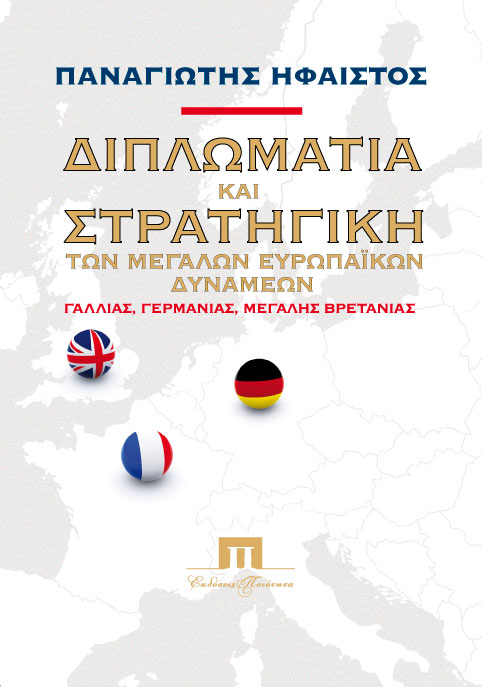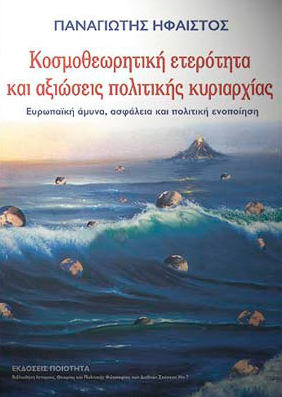Π. Ήφαιστοςhttps://www.facebook.com/groups/TholoVasileioEU/
Η Ελλάδα κινείται σε ναρκοπέδιο. Είναι το ναρκοπέδιο της ΕΕ και των Διατλαντικών σχέσεων. Ένα πεδίο επικίνδυνο το οποίο οι συχνά επιστημονικά μεταμφιεσμένοι χασομέρηδες της Πλατείας Κολωνακίου (ενίοτε περνούν και από τα Εξάρχεια) έβλεπαν ως ένα περίπου ανθόσπαρτο βίο. Γιατί είναι μεγάλο ερώτημα συνάμα και μυστήριο όπως και οι άπειρες ύβρεις κατά όποιου επισήμανε ότι η ευρωπαϊκή ολοκλήρωση μετά το 1992 βρίσκεται σε πλήρη μετάβαση ενώ κάθεται πάνω κινούμενες σεισμικές πλάκες. Της έλαχε λόγω φρικτών λαθών των ελληνικών κυβερνήσεων των τελευταίων δεκαετιών να βρεθεί πεσμένη στο έδαφος. Για να σηκωθεί όρθια η Ελλάδα πρέπει ταυτόχρονα να σηκώσει και την σημαία του πολιτικού ορθολογισμού. Ενός πολιτικού ορθολογισμού που η ΕΕ απώλεσε λόγω ακριβώς της αδυναμίας να αναπτύξει ένα νέο μεταψυχροπολεμικό στρατηγικό ορθολογισμό. Το εγχείρημα αυτό δεν είναι εύκολο. Αντίθετα είναι από δύσκολο μέχρι ακατόρθωτο. Παραμένει γεγονός ότι ο νέος Έλληνας Υπουργός Εξωτερικών έχει εύρωστη πολιτική παιδεία και κυρίως γνώση της ευρωπαϊκής πολιτικής, πολύ περισσότερο της Γερμανικής. Το πολιτικό χάρισμα άλλων, ακόμη, έστω και εάν δεν συνοδεύεται από αντίστοιχη γνώση των διαδρομών και σημερινών δεδομένων της Ευρωπαϊκής πολιτικής είναι ένα ακόμη θετικό στοιχείο.
Κατωτέρω παρατίθεται ένα αρκετά περιεκτικό άρθρο του GeorgeFriedmanτου ΙνστιτούτουStratfor. Δεν είναι ότι μας λέει κάτι νέο που δεν ξέρουμε. Το γράφει όμως σε μια κομβική στιγμή ενώ είναι γνωστό ότι σε αντίθεση με κάποια εξαρτημένα κράτη όπου αντίστοιχα ινστιτούτα έχουν «σχέσεις» με εξωγενή συμφέροντα τα Αμερικανικά ινστιτούτα αυτού του είδους είναι άρρηκτα συνδεδεμένα με το πολυσχιδές σύστημα λήψης στρατηγικών αποφάσεων. Ποια είναι τα δεδομένα; Συντομογραφικά γράφουμε τα εξής και ο ενδιαφερόμενος μπορεί να ανατρέξει σε σχετικές δημοσιεύσεις.
Η Γερμανία βρίσκεται στο κέντρο της Ευρώπης. Για μια σειρά λόγους είναι το ισχυρότερο κράτος της Ευρώπης και το μόνο που την διακρίνει από τις άλλες μεγάλες δυνάμεις (Βρετανία, Γαλλία, Ρωσία) είναι η μη κατοχή πυρηνικών όπλων. Το γεγονός ότι ηττήθηκε στον Δεύτερο Παγκόσμιο Πόλεμο παράλληλα με τα φρικτά εγκλήματα των ναζί έδωσε αφορμή στις νικήτριες δυνάμεις να την αλυσοδέσουν. Κυριολεκτικά να την αλυσοδέσουν. Δεν θα επεκταθώ εδώ γιατί σε δέκα περίπου μονογραφίες και πολλά άλλα κείμενα δεν λείπουν τα κεφάλαια με τίτλο «το γερμανικό ζήτημα».
Στέκομαι εδώ στο γεγονός ότι η Γερμανίδα καγκελάριος επισκέφτηκε την Ουάσιγκτον, γεγονός πολύ σημαντικό. Οι Ευρωατλαντικές σχέσεις στις οποίες εντάσσεται μια τέτοια επίσκεψη είναι οι διευρυμένες ευρωστρατηγικές σχέσεις. Κανείς απαιτείται να έχει εποπτεία αμφότερων των επικαλυπτόμενων στρατηγικών πεδίων (βλ. συνημμένο πίνακα). Στέκομαι μόνο στο γεγονός ότι κάθε Γερμανική κίνηση προκαλεί συναγερμό στις άλλες μεγάλες Ευρωπαϊκές Δυνάμεις, ιδιαίτερα εάν η Γερμανία χαμογελά ή θυμώνει με την Ρωσία ή τις ΗΠΑ. Οι ΗΠΑ, όπως γνωρίζουμε, είναι η κύρια σύμμαχος της Μεγάλης Βρετανίας. Η τελευταία, παθαίνει αλλεργία όποτε μια δυτικοευρωπαϊκή δύναμη ή ένας ηπειρωτικός συνδυασμός κρατών αναπτύσσει στενές σχέσεις με τις ΗΠΑ. Τέλη της δεκαετίας του 1950 ο Βρετανός πρωθυπουργός απείλησε τον Γάλλο πρόεδρο ότι η Μεγάλη Βρετανία θα αντιδράσεις «άνευ ορίων» εάν συμβεί κάτι τέτοιο («Διπλωματία και Στρατηγική των Μεγάλων Ευρωπαϊκών Δυνάμεων», κεφ. 4).
Η μεγάλη στρατηγική αλλαγή του 1990, η επανένωση των δύο γερμανικών κρατών άλλαξε δραστικά το στρατηγικό περιβάλλον στην Ευρώπη, έθεσε σε κίνηση μια αργόσυρτη πλην πολύ σημαντική μετατόπιση του κέντρου βάρους της Αμερικανικής στρατηγικής, άλλαξε το πλαίσιο σχέσεων Γαλλίας-Βρετανίας, το Παρίσι νόμισε ότι με το να δέσει την Γερμανία με νομισματικούς δεσμούς (όπως έλεγαν τότε οι γάλλοι) θα ήλεγχαν την Γερμανική ισχύ, δημιουργήθηκε η ΟΝΕ ένα δηλαδή ένα από τα πλέον τερατώδη θεσμικά συστήματα στην Ευρωπαϊκή ιστορία (η εξίσου φρικτή απόφαση της Ελλάδας να αφήσει την δημοσιονομική της ευελιξία και να ενταχθεί σε αυτό τον λάκκο των λεόντων είναι εξίσου μυστήρια) και η Ατλαντική Συμμαχία διαιωνίστηκε με δράσεις «εκτός περιοχής» και με τρόπο που αναιρούσε κάθε φιλοδοξία όχι μιας ευρωπαϊκής κοινής άμυνας αλλά τουλάχιστον μιας συμμαχικής σύγκλισης (το πώς τόσοι πολλοί στην Ευρώπη έβλεπαν κάτι το αντίθετο τις δύο τελευταίες δεκαετίες είναι ένα ακόμη τεκμήριο γιατί η Ελλάδα έμεινε μετεξεταστέα στα πεδία της διεθνούς και ευρωπαϊκής πολιτικής).
Αυτά και οι λεπτομέρειες και αποχρώσεις είναι αναγκαία γνώση για να κινηθεί η Ελλάδα προσεκτικά στο υποχρεωτικό διπλωματικό παιχνίδι που εισήλθε μετά τις τελευταίες εκλογές. Γιατί ενώ η προπέτεια των προγενέστερων κυβερνήσεων που εξουθένωσαν και εκποίησαν τους Έλληνες δεν έχει όρια, η νέα και εξ αντικειμένου άπειρη κυβέρνηση θα σχοινοβατήσει. Δεν υπήρχε και δεν υπάρχει επιλογή. Δεν θα ήταν μάλιστα υπερβολή εάν πούμε ότι μετά από δύο περίπου αιώνες κυριαρχίας εγχώριων λίγο πολύ πραιτοριανών της εξάρτησης η νέα διακυβέρνηση έχει όλες τις προϋποθέσεις εάν καταφέρει να κρατήσει την Ελλάδα όρθια να επιτελέσει ένα ιστορικό επίτευγμα. Δύσκολο μεν αλλά όχι ανέφικτο: Αφού κρατηθούμε όρθιοι με περισυλλογή να χαράξουμε μια στρατηγική επιβίωσης. Κάτι τέτοιο απαιτεί βαθιά κατανόηση των ανελέητων ανταγωνιστικών προϋποθέσεων του κρατοκεντρικού κόσμου μέσα στον οποίο υπάρχει και αναπτύσσεται κάθε σύγχρονο κράτος. Μέγα θέμα όμως που δεν εξαντλείται εδώ. Μερικά εγχειρήματα έγιναν και πολλά έπονται. Το ζήτημα όμως είναι ότι μετά τα πολλά παθήματα της Ελλάδας ως ζήτημα στοιχειώδους λογικής απαιτείται κάθε ορθολογιστική ανάλυση και εκτίμηση να μην μοιάζει ως φωνή στην έρημο.
Ακολουθεί η ανάλυση του Friedmanυπό την αίρεση της επισήμανσης πιο πάνω για τον ρόλο των ινστιτούτων στις ΗΠΑ ως μέσων καλλιέργειας των σκοπών της Αμερικανικής στρατηγικής. Αυτή η ανάλυση όπως και άλλες κάνουν σαφές ότι η Ελλάδα είτε το θέλει είτε όχι βρέθηκε στο επίκεντρο. Όπως υποστηρίχθηκε μόλις, επιλογή να μείνουμε πεσμένοι κάτω δεν έχουμε. Το ζήτημα είναι εάν θα σηκωθούμε όρθιοι, υπό ποιες προϋποθέσεις και ποιους προσανατολισμούς θα ακολουθήσουμε στην συνέχεια
GermanyEmerges
FEBRUARY 10, 2015 | 09:00 GMT
German Chancellor Angela Merkel, accompanied by French President Francois Hollande, met with Russian President Vladimir Putin on Feb. 6. Then she met with U.S. President Barack Obama on Feb. 9. The primary subject was Ukraine, but the first issue discussed at the news conference following the meeting with Obama was Greece. Greece and Ukraine are not linked in the American mind. They are linked in the German mind, because both are indicators of Germany’s new role in the world and of Germany’s discomfort with it.
It is interesting to consider how far Germany has come in a rather short time. When Merkel took office in 2005, she became chancellor of a Germany that was at peace, in a European Union that was united. Germany had put its demands behind it, embedding itself in a Europe where it could be both prosperous and free of the geopolitical burdens that had led it into such dark places. If not the memory, then the fear of Germany had subsided in Europe. The Soviet Union was gone, and Russia was in the process of trying to recover from the worst consequences of that collapse. The primary issue in the European Union was what hurdles nations, clamoring to enter the union, would have to overcome in order to become members. Germany was in a rare position, given its history. It was in a place of comfort, safety and international collegiality.
The world that Merkel faces today is startlingly different. The European Union is in a deep crisis. Many blame Germany for that crisis, arguing that its aggressive export policies and demands for austerity were self-serving and planted the seeds of the crisis. It is charged with having used the euro to serve its interests and with shaping EU policy to protect its own corporations. The vision of a benign Germany has evaporated in much of Europe, fairly or unfairly. In many places, old images of Germany have re-emerged, if not in the center of many countries then certainly on the growing margins. In a real if limited way, Germany has become the country that other Europeans fear. Few countries are clamoring for membership in the European Union, and current members have little appetite for expanding the bloc’s boundaries.
At the same time, the peace that Germany had craved is in jeopardy. Events in Ukraine have aroused Russian fears of the West, and Russia has annexed Crimea and supported an insurgency in eastern Ukraine. Russia’s actions have sparked the United States’ fears of the re-emergence of a Russian hegemon, and the United States is discussing arming the Ukrainians and pre-positioning weapons for American troops in the Baltics, Poland, Romania and Bulgaria. The Russians are predicting dire consequences, and some U.S. senators are wanting to arm the Ukrainians.
If it is too much to say that Merkel’s world is collapsing, it is not too much to say that her world and Germany’s have been reshaped in ways that would have been inconceivable in 2005. The confluence of a financial crisis in Europe that has led to dramatic increases in nationalism — both in the way nations act and in the way citizens think — with the threat of war in Ukraine has transformed Germany’s world. Germany’s goal has been to avoid taking a leading political or military role in Europe. The current situation has made this impossible. The European financial crisis, now seven years old, has long ceased being primarily an economic problem and is now a political one. The Ukrainian crisis places Germany in the extraordinarily uncomfortable position of playing a leading role in keeping a political problem from turning into a military one.
The German Conundrum
It is important to understand the twin problems confronting Germany. On the one hand, Germany is trying to hold the European Union together. On the other, it wants to make certain that Germany will not bear the burden of maintaining that unity. In Ukraine, Germany was an early supporter of the demonstrations that gave rise to the current government. I don’t think the Germans expected the Russian or U.S. responses, and they do not want to partake in any military reaction to Russia. At the same time, Germany does not want to back away from support for the government in Ukraine.
There is a common contradiction inherent in German strategy. The Germans do not want to come across as assertive or threatening, yet they are taking positions that are both. In the European crisis, it is Germany that is most rigid not only on the Greek question but also on the general question of Southern Europe and its catastrophic unemployment situation. In Ukraine, Berlin supports Kiev and thus opposes the Russians but does not want to draw any obvious conclusions. The European crisis and the Ukrainian crisis are mirror images. In Europe, Germany is playing a leading but aggressive role. In Ukraine, it is playing a leading but conciliatory role. What is most important is that in both cases, Germany has been forced — more by circumstance than by policy — to play leading roles. This is not comfortable for Germany and certainly not for the rest of Europe.
Germany’s Role in Ukraine
The Germans did play a significant part in the fall of Ukrainian President Viktor Yanukovich’s government. Germany had been instrumental in trying to negotiate an agreement between Ukraine and the European Union, but Yanukovich rejected it. The Germans supported anti-Yanukovich demonstrators and had very close ties to one of the demonstration leaders, current Kiev Mayor VitaliKlitschko, who received training in a program for rising leaders sponsored by the Christian Democratic Union — Merkel’s party. The Germans condemned the Russian annexation of Crimea and Moscow’s support for the Ukrainian secessionists in the east. Germany was not, perhaps, instrumental in these events, but it was a significant player.
As the Germans came to realize that this affair would not simply be political but would take on a military flavor, they began to back away from a major role. But disengagement was difficult. The Germans adopted a complex stance. They opposed the Russians but also did not want to provide direct military support to the Ukrainians. Instead, they participated in the sanctions against Russia while trying to play a conciliatory role. It was difficult for Merkel to play this deeply contradictory role, but given Germany’s history the role was not unreasonable. Germany’s status as a liberal democracy is central to its post-war self-conception. That is what it must be. Therefore, supporting the demonstrators in Kiev was an obligation. At the same time, Germany — particularly since the end of the Cold War — has been uneasy about playing a direct military role. It did that in Afghanistan but not Iraq. And participating in or supporting a military engagement in Ukraine resurrects memories of events involving Russia that Berlin does not want to confront.
Therefore, Germany adopted a contradictory policy. Although it supported a movement that was ultimately anti-Russian and supported sanctions against the Russians, more than any other power involved it does not want the political situation to evolve into a military one. It will not get involved in any military action in Ukraine, and the last thing Germany needs now is a war to its east. Having been involved in the beginnings of the crisis, and being unable to step away from it, Germany also wants to defuse it.
The Greek Issue
Germany repeated this complex approach with Greece for different reasons. The Germans are trying to find some sort of cover for the role they are playing with the Greeks. Germany exported more than 50 percent of its gross domestic product, and more than half of that went to the European free trade zone that was the heart of the EU project. Germany had developed production that far exceeded its domestic capacity for consumption. It had to have access to markets or face a severe economic crisis of its own.
But barriers are rising in Europe. The attacks in Paris raised demands for the resurrection of border guards and inspections. Alongside threats of militant Islamist attacks, the free flow of labor from country to country threatened to take jobs from natives and give them to outsiders. If borders became barriers to labor, and capital markets were already distorted by the ongoing crisis, then how long would it be before weaker economies used protectionist measures to keep out German goods?
The economic crisis had unleashed nationalism as each country tried to follow policies that would benefit it and in which many citizens — not in power, but powerful nonetheless — saw EU regulations as threats to their well-being. And behind these regulations and the pricing of the euro, they saw Germany’s hand.
This was dangerous for Germany in many ways. Germany had struggled to shed its image as an aggressor; here it was re-emerging. Nationalism not only threatened to draw Germany back to its despised past, but it also threatened the free trade essential to Germany’s well-being. Germany didn’t want anyone to leave the free trade zone. The eurozone was less important, but once they left the currency bloc, the path to protectionism was short. Greece was of little consequence itself, but if it demonstrated that it would be better off defaulting than paying its debt, other countries could follow. And if they demonstrated that leaving the free trade zone was beneficial, then the entire structure might unravel.
Germany needed to make an example of Greece, and it tried very hard last week to be unbending, appearing to be a bit like the old Germany. The problem Germany had was that if the new Greek government wanted to survive, it couldn’t capitulate. It had been elected to resist Germany. And whatever the unknowns, it was not clear that default, in whole or part, wasn’t beneficial. And in the end, Greece could set its own rules. If the Greeks offered a fraction of repayment, would anyone refuse when the alternative was nothing?
Therefore, Germany was facing one of the other realities of its position — one that goes back to its unification in 1871. Although economically powerful, Germany was also extremely insecure. Its power rested on the ability and willingness of other countries to give Germany access to their markets. Without that access, German power could fall apart. With Greece, the Germans wanted to show the rest of Europe the consequences of default, but if Greece defaulted anyway, the only lesson might be that default works. Just as it had been in the past, Germany was simultaneously overbearing and insecure. In dealing with Greece, the Germans could not risk bringing down the European Union and could not be sure which thread, if pulled on, would unravel it.
Merkel’s Case in Washington
It was with this on her mind that Merkel came to Washington. Facing an overwhelming crisis within the European Union, Germany could not afford a war in Ukraine. U.S. threats to arm the Ukrainians were exactly what she did not need. It wasn’t just that Germany had a minimal army and couldn’t participate or, in extremis, defend itself. It was also that in being tough with Greece, Germany could not go much further before being seen as the strongman of Europe, a role it could not bear.
Thus, she came to Washington looking to soften the American position. But the American position came from deep wells as well. Part of it had to do with human rights, which should not be dismissed as one source of decision-making in this and other administrations. But the deeper well was the fact that for a hundred years, since World War I, through World War II and the Cold War, the United States had a single rigid imperative: No European hegemon could be allowed to dominate the Continent, as a united Europe was the only thing that might threaten national security. Therefore, regardless of any debate on the issue, the U.S. concern about a Russian-dominated Ukraine triggered the primordial fear of a Russian try at hegemony.
It was ironic that Germany, which the United States blocked twice as a hegemon, tried to persuade the United States that increased military action in Ukraine would not solve the problem. The Americans knew that, but they also knew that if they backed off now, the Russians would read it as an opportunity to press forward. Germany, which had helped set in motion both this crisis and the European crisis, was now asking the United States to back off. The request was understandable, but simply backing off was not possible. She needed to deliver something from Putin, such as a pledge to withdraw support to Ukrainian secessionists. But Putin needed something, too: a promise for an autonomous province. By now Merkel could live with that, but the Americans would find it undesirable. An autonomous Ukrainian province would inevitably become a base for undermining the rest of the country.
This is the classic German problem told two ways. Both derive from disproportionate strength overlying genuine weakness. The Germans are trying to reshape Europe, but their threats are of decreasing value. The Germans tried to reshape Ukraine but got trapped in the Russian reaction. In both cases, the problem was that they did not have sufficient power, instead requiring the acquiescence of others. And that is difficult to get. This is the old German problem: The Germans are too strong to be ignored and too weak to impose their will. Historically, the Germans tried to increase their strength so they could impose their will. In this case, they have no intention of doing so. It will be interesting to see whether their will can hold when their strength is insufficient.






